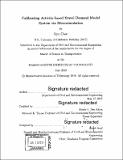Calibrating activity-based travel demand model system via microsimulation
Author(s)
Chen, Siyu (Scientist in civil and environmental engineering)
Download1129597143-MIT.pdf (5.294Mb)
Other Contributors
Massachusetts Institute of Technology. Department of Civil and Environmental Engineering.
Advisor
Moshe E. Ben-Akiva.
Terms of use
Metadata
Show full item recordAbstract
This thesis addresses the problem of calibrating activity-based travel demand model systems. After estimation, it is common practice to use aggregate measurements to calibrate the estimated model system's parameters. However, calibration of activity-based model systems has received much less attention. Existing calibration approaches are myopic heuristics in the sense that they do not consider inter-dependency among choice-models and do not have a systematic way to adjust model parameters. Also, other simulation-based approaches do not perform well in large-scale applications. In this thesis, we focus on utility-maximizing nested logit activity-based model systems and calibrating count based aggregate statistics like OD flows, mode shares, activity shares and so on. We formulate the calibration problem as a simulation-based optimization problem and propose a stochastic gradient-based solution procedure to solve it. The solution procedure relies on microsimulation to calculate expected aggregate statistics of interest to the calibration problem. Additionally, we derive approximate analytical expressions for the gradient of the objective function -that are evaluated through microsimulation on mini-batches of the population. The proposed solution procedure is sensitive to the fundamental structure of the activity-based model system and is non-myopic in considering the dependencies across its model components. Finally, we show -through a real-world application- that the proposed solution procedure outperforms other state-of-the-art purely simulation-based optimization approaches in terms of computational efficiency, stability, and convergence. We also compare various gradient-based solution algorithms to determine the best algorithm to update the parameters. This work has the potential to facilitate wider and easier application of activity-based model systems.
Description
Thesis: S.M. in Transportation, Massachusetts Institute of Technology, Department of Civil and Environmental Engineering, 2019 Cataloged from PDF version of thesis. Includes bibliographical references (pages 79-83).
Date issued
2019Department
Massachusetts Institute of Technology. Department of Civil and Environmental EngineeringPublisher
Massachusetts Institute of Technology
Keywords
Civil and Environmental Engineering.